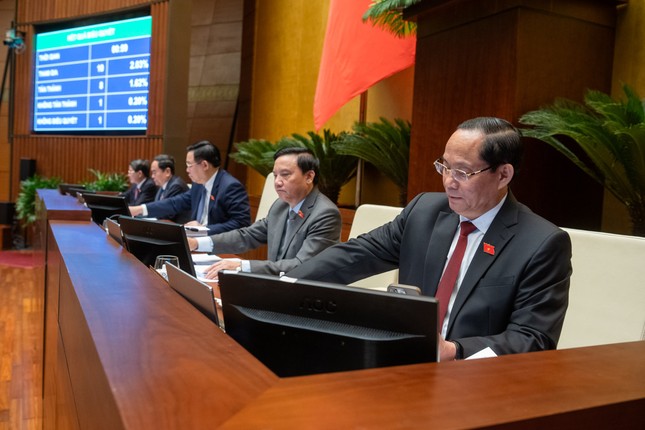Integrated land use planning at 3 levels
The Land Law of 2024 was passed by the 15th National Assembly to institutionalize Resolution No. 18-NQ/TW dated June 16, 2022 of the Central Executive Committee, on “Continuing to innovate, improve the system, policies, enhance the effectiveness of land management and use, creating momentum to make our country a high-income developed country”.
The enactment of the Land Law is a key task in the orientation of perfecting the land system and policies that are compatible with the market economy orientation towards socialism, with the goal of creating a legal framework for efficient, sustainable and resource-saving land management and use.

Parliament leaders vote on the Land Law draft (amended).
The Land Law of 2024 consists of 16 chapters and 260 articles, which focuses on improving regulations and policies regarding:
Building a comprehensive land use planning system at 3 levels; innovating the process, content, methods of land use planning and plans.
Allocating land, leasing land, changing land use purposes; mainly carrying out land allocation, land leasing through auctioning land use rights, bidding for projects using land; precisely defining cases where land is allocated or leased without auctioning land use rights, bidding for projects using land; specifically regulating cases where land is leased for one-time payment, in line with the nature and purpose of land use, ensuring stable revenue.
Authority, purpose, scope of land recovery, specific conditions, criteria for recovering land for economic and social development for national and public interests; about compensation, support, resettlement, land recovery for national defense and security purposes, economic and social development for national and public interests.
The mechanism for determining land prices according to market principles, the supervision and monitoring mechanisms of the Central Government and People’s Councils in constructing land price lists…
Land for ethnic minorities; land managed and used by agricultural and forestry companies.
Issuing Certificates of Land Use Rights, ownership of houses associated with land.
Multi-purpose land use regime; agricultural land combined with trade and services; defense and security land combined with labor-intensive production and economic construction; religious land combined with other purposes; water-front land used for multiple purposes; coastal erosion activities…
Delegating authority to localities in land management and use within their jurisdictions, while establishing monitoring, inspection, and supervision mechanisms at the central level through regulations on the land information system, centralized land database, promoting administrative reforms, digital transformation in the field of land management and use; ensuring the centralized, unified management, operation, connection, and sharing of information from the central to local levels.
Ensuring the safety and soundness of the credit organization system
The Law on Credit Institutions of 2024 consists of 15 chapters and 210 articles, an increase of 5 chapters and 47 articles compared to the current Law on Credit Institutions, focusing on improving regulations and policies regarding:
The organization, administration, operation, risk management of credit institutions; preventing and limiting manipulation, control of credit institution activities through regulations such as strict criteria and conditions for managers and administrators of credit institutions; enhancing duties and powers of the Board of Directors, Board of Members, Board of Controllers of credit institutions…
Ensuring that credit institution activities meet safety requirements, while creating conditions for credit institutions to provide diverse products and services, including supply through electronic means; supplementing regulations on controlled experimentation mechanisms in the banking sector.
Organizations and operations of policy banks aiming to affirm the legal status and create conditions for the development of these banks.
Dealing with weak credit institutions such as regulations on early intervention, special control, special exceptional loans of credit institutions based on enhancing the self-responsibility of credit institutions, ensuring the safety and soundness of the credit organization system.
Handling bad debts, secured assets based on legalizing certain appropriate contents in Resolution No. 42/2017/QH14 of the National Assembly.
State management, inspection, examination, supervision in the banking sector.












